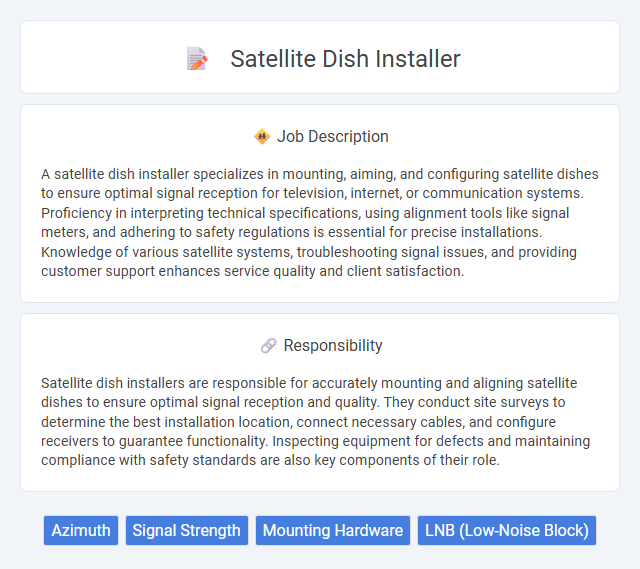
A satellite dish installer specializes in mounting, aiming, and configuring satellite dishes to ensure optimal signal reception for television, internet, or communication systems. Proficiency in interpreting technical specifications, using alignment tools like signal meters, and adhering to safety regulations is essential for precise installations. Knowledge of various satellite systems, troubleshooting signal issues, and providing customer support enhances service quality and client satisfaction.
Individuals with good physical health and manual dexterity are likely suitable for a satellite dish installer job, as it often requires climbing, lifting, and precise adjustments. Those with a fear of heights, limited mobility, or poor hand-eye coordination might find the role challenging. Basic technical skills and problem-solving abilities will probably enhance job performance and satisfaction in this field.
Qualification
A satellite dish installer requires technical skills in electronics and signal transmission, often backed by a high school diploma or equivalent, with specialized training or certification preferred. Proficiency in using tools such as signal meters, levels, and hand tools is essential for precise installation and troubleshooting. Strong knowledge of satellite systems, safety procedures, and customer service enhances on-site efficiency and client satisfaction.
Responsibility
Satellite dish installers are responsible for accurately mounting and aligning satellite dishes to ensure optimal signal reception and quality. They conduct site surveys to determine the best installation location, connect necessary cables, and configure receivers to guarantee functionality. Inspecting equipment for defects and maintaining compliance with safety standards are also key components of their role.
Benefit
Satellite dish installers likely enjoy benefits such as competitive pay and flexible work schedules, which can enhance work-life balance. There is a strong possibility of gaining valuable technical skills and experience in telecommunications. Opportunities for career advancement or overtime pay might also be available, increasing overall job satisfaction.
Challenge
Satellite dish installation likely involves the challenge of working in varying weather conditions and at significant heights, which requires careful attention to safety protocols. Navigating complex wiring and alignment to ensure optimal signal reception could demand technical expertise and precision. The installer may also face challenges in troubleshooting issues on-site, requiring problem-solving skills under time constraints.
Career Advancement
Satellite dish installer roles offer a clear pathway for career advancement through technical skill development and certification acquisition. Professionals can progress to supervisory positions, project management, or specialize in advanced satellite communication technologies. Continuous training in new satellite systems and signal optimization significantly enhances job prospects and salary growth.
Key Terms
Azimuth
Satellite dish installers expertly calibrate the azimuth to ensure precise alignment with geostationary satellites, optimizing signal strength and quality. Accurate azimuth settings are critical for reliable satellite TV reception and internet connectivity in residential and commercial applications. Mastery of specialized tools and GPS technology enables installers to achieve exact azimuth adjustments, minimizing signal interference and maximizing overall system performance.
Signal Strength
Satellite dish installers ensure optimal signal strength by accurately positioning and aligning the dish toward the satellite. They use specialized tools such as signal meters and spectrum analyzers to maximize reception quality and minimize interference. Consistent calibration and troubleshooting during installation maintain signal integrity crucial for uninterrupted service.
Mounting Hardware
Satellite dish installer responsibilities include selecting and securely attaching mounting hardware tailored to various structures such as rooftops, walls, or poles. Precision in aligning brackets, bolts, and mounts ensures optimal signal reception and long-term stability under diverse weather conditions. Proficiency with tools like drills, levelers, and torque wrenches is critical for achieving durable installation results.
LNB (Low-Noise Block)
Satellite dish installers specialize in accurately positioning and securing satellite dishes to ensure optimal signal reception, with a crucial focus on the LNB (Low-Noise Block) component, which amplifies and converts satellite signals for the receiver. Proper alignment and installation of the LNB directly impact the quality and strength of the satellite signal, minimizing noise and interference for clearer television or data transmission. Expertise in selecting, mounting, and calibrating LNBs ensures maximum efficiency and customer satisfaction in satellite communication systems.
 kuljobs.com
kuljobs.com